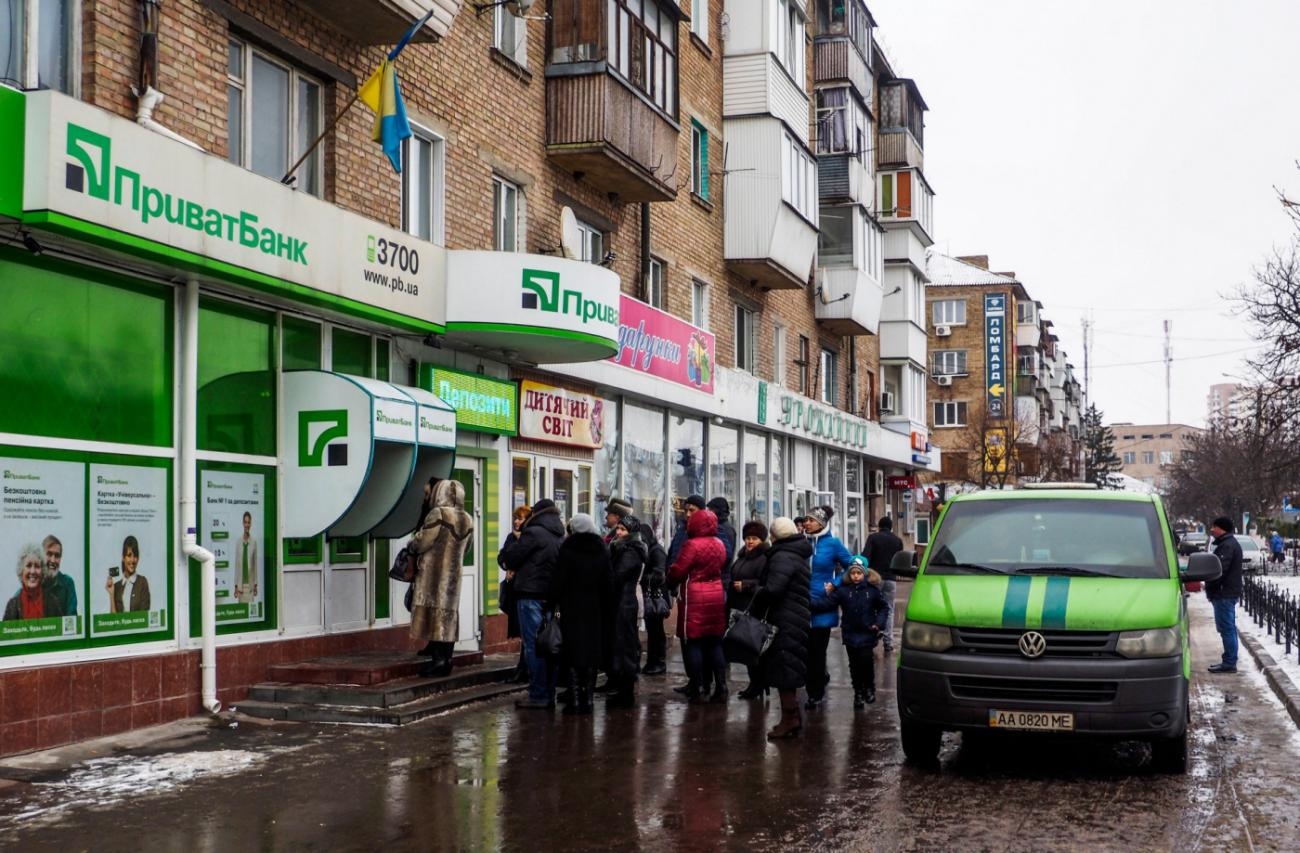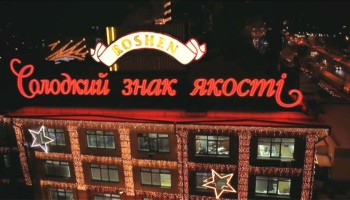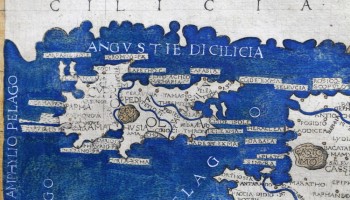The former chairwoman of Ukraine’s central bank dubbed it one of the biggest financial scandals of the 21st century.
Valeria Hontareva was describing the alleged theft of US$5.5 billion from PrivatBank, once the country’s largest commercial lender. The suspected masterminds are the bank’s two oligarch owners: Ihor Kolomoisky and Hennadiy Boholiubov, who stand accused of absconding with an amount roughly equal to 5 percent of the country’s gross domestic product. According to court records, both men are said to have recently been living in Switzerland, though Kolomoisky appears to be spending time in Israel.
“Large-scale coordinated fraudulent actions of the bank shareholders and management caused a loss to the state of at least $5.5 billion,” Hontareva said in March 2018. “This is 33 percent of the population’s deposits … [and] 40 percent of our country's monetary base.”
Now, for the first time, OCCRP has traced the mechanism that appears to have allowed Kolomoisky and Boholiubov to funnel such vast wealth out of Ukraine: The money was moved through a PrivatBank subsidiary in Cyprus.
The arrangement helped hide the fact that cash was disappearing because the National Bank of Ukraine treated the Cyprus branch of PrivatBank the same as it would domestic branches. This designation meant officials never detected that cash transferred to Cyprus was leaving Ukraine.
Meanwhile, Cypriot regulators either failed to detect that the various bank transfers totalling $5.5 billion were backed by bogus contracts, or didn’t take the necessary action to stop them.
The system allowed billions of dollars to be pumped through the PrivatBank accounts, which were held in Cyprus by offshore companies.
This account is based on a forensic audit by Kroll, the U.S.-based corporate investigation and risk consulting firm. The report, which is based on PrivatBank’s own records and was obtained exclusively by OCCRP, also reveals that there was little distinction between Kolomoisky and Boholiubov’s corporate and personal accounts.
Ukraine nationalized PrivatBank in December 2016, saddling taxpayers with a $5.9 billion bailout. The nationalization was widely supported by the international community, including the IMF, the European Union, and the United States, which called it a “milestone in economic reform and the fight against corruption.”
Kolomoisky has said he wants $2 billion in PrivatBank capital returned to him. And on April 19, a Kyiv court ruled PrivatBank's nationalization unlawful, deciding in favor of the oligarch and setting the stage for a prolonged legal battle.
In a letter circulated to the media by Kolomoisky’s Swiss office, the oligarch refuted allegations by the National Bank of Ukraine that Privatbank had engaged in fraudulent lending practices.
“I categorically deny the allegations made by the National Bank of Ukraine,” Kolomoisky said, adding that regulators had all the access they needed to monitor his bank’s activities. He painted the authorities’ nationalization of his lending business as an asset grab.
“Management of the [Ukrainian central bank] had as its main purpose not the support of the country's largest bank, but its nationalization and the expropriation of the assets provided as security, together with the persecution and pressuring of the former shareholders,” Kolomoisky said.
Boholiubov declined to speak on the record.
The new revelations about how the scheme worked emerge just as Kolomoisky stands to increase his already considerable influence in Ukraine through the country’s presidential election. A candidate favoured by the oligarch — Volodymyr Zelenskiy, a comedian who appears on his television channel 1+1 — won the first round of the election, which may determine whether the country continues its already shaky course of anti-corruption reforms. Zelenskiy will now face off against President Poroshenko in the final round.
An independent analysis funded by the Council of Europe and published Feb. 18 shows that Kolomoisky's 1+1 channel overwhelmingly favors Zelenskiy in its news coverage. On March 30, the day before the first round of the elections — which by law should be free of campaigning — the channel was scheduled to broadcast 7.5 hours of Zelenskiy’s programs.
The candidate has disputed that he owes Kolomoisky anything.
“He is my business partner, not my boss,” Zelenskiy said in an interview.
Accounting Tricks
Privatbank launched its Cyprus operation in the late 1990s. No other Ukrainian lender is known ever to have received permission from the National Bank of Ukraine to open an overseas branch.
The head of the National Bank of Ukraine, Yakiv Smolii, said PrivatBank’s Cyprus office didn’t materially differ from the lender’s branches in Ukrainian cities such as Kharkiv or Lutsk, so cash being funnelled there didn’t trigger any regulatory action. Ukrainian officials did nothing to stop the money from leaving the country. (Smolii spoke to OCCRP in his capacity as co-author of the book “Private Story: The Rise and Fall of Ukraine’s Largest Private Bank.”)
Once the funds reached Cyprus, they were transferred to various offshore companies using SWIFT, the Society for Worldwide Interbank Financial Telecommunication. The network lets financial institutions worldwide send and receive money safely. (The system was not required to move money from Ukraine to PrivatBank’s Cyprus branch.)
Because Cypriot regulators viewed the PrivatBank branch in their country as a separate legal entity from the parent in Ukraine, they never flagged the money flows to Ukrainian authorities.
“This was what allowed the abuse, the concealing of transactions from regulators, tax and customs authorities,” Smolii said.
Two years have passed since the PrivatBank scandal forced regulators to nationalize the financial institution in a significant economic blow to the already strapped country. Ukraine has the lowest per capita GDP in Europe, and the fourth lowest of the 15 former Soviet countries, according to the IMF.
Now hopes are fading that any of the stolen money will be recovered. By the time regulators took over PrivatBank, the $5.5 billion had already been transferred to banks in Austria, Luxembourg, and Latvia. From there, the trail goes cold.
How the Money Disappeared
The central mechanism in the scheme was a series of insider loans to companies Kolomoisky and Boholiubov controlled. In most instances, financial records show Ukrainian shell companies borrowed money from PrivatBank in Ukraine, then transferred it to Cyprus branch accounts held by offshore businesses, many of which were registered in the British Virgin Islands (BVI).
These companies’ formal owners are hidden, but the Kroll report says they were all effectively run out of PrivatBank headquarters in Dnipropetrovsk (now Dnipro), Ukraine. There, a “bank within the bank” orchestrated a sort of pyramid scheme in which loans were made to shell companies and offshores that in turn used the funds to pay bogus contracts with other companies. This second set of companies then used the money to repay loans taken from PrivatBank. In this way, money continued to cycle through the bank, making it look like loans were being repaid when in reality the institution was at substantial financial risk.
The pattern of payments was so complex that a computer algorithm probably generated it, according to financial experts cited in a London court case.
Meanwhile, the billions of dollars that had arrived from Ukraine churned through accounts at PrivatBank Cyprus that were held by offshore companies. The amounts were massive. In the eight years before PrivatBank was nationalized, $8 billion passed through Grizal Enterprises, $14.9 billion through Hangli International Holdings, and $12 billion through Claresholm Marketing (all registered in the BVI). Another $11.2 billion passed through Divot Enterprises, registered in St. Kitts and Nevis, and $6.5 billion through Pointex Sale in the UK.
According to testimony given in a London court case by PrivatBank’s lawyers after its nationalization, the activity had all the hallmarks of a money-laundering operation designed to obscure the origin and ultimate destination of cash.
Money also cycled between Kolomoisky and Boholiubov’s personal accounts and the businesses they steered, suggesting that no clear boundaries existed between the oligarchs’ corporations and their own finances.
For instance, Grizal Enterprises paid about $40 million to Boholiubov’s personal account in Cyprus between 2013 and 2016. He sent $83 million back to Grizal. And the pattern repeated over and over: Between 2013 and 2016, Trival Ltd. paid about $360 million into Kolomoisky’s personal account, Ditton Holdings paid about $133 million, and other related parties paid another $150 million. Kolomoisky returned almost all the funds to Trival and Ditton.
The transactions make no sense for a legally acting business.
Kateryna Rozhkova, first deputy head of the National Bank of Ukraine, bluntly refers to the Cyprus branch as “a money laundromat, nothing else.”
Suspicions Arise
In comments to OCCRP, the Central Bank of Cyprus said that it conducted two onsite examinations of PrivatBank’s Cyprus branch in 2015, leading it to inform authorities in Cyprus, Ukraine, and other countries that money was flowing out of Ukraine. The regulator also imposed a 1.5 million euro fine on the bank on Oct. 31, 2016, only weeks before Ukrainian authorities nationalized PrivatBank.
According to a senior central bank official in Cyprus, regulators placed restrictions on the license of PrivatBank’s local branch in December of 2016, barring it from conducting further transactions. The lender is set to close once outstanding legal procedures are resolved.
“What we looked for during our inspection were … the transactions carried out between various companies,” said a senior former Cypriot central bank official who spoke on condition of anonymity, citing banking secrecy laws. “That is where we noted that those complicated schemes were developing that allowed funds to move from one company to another and disappear.”
Once the money had left Cyprus, the official said, it wound up in various companies that have since been identified as being connected to Kolomoisky and Boholiubov.
Cyprus’ Financial Intelligence Unit, MOKAS, said it was aware of the allegations against the PrivatBank shareholders but declined to comment.
Meanwhile, in the runup to PrivatBank’s nationalization in December 2016, billions of dollars held in its Cyprus branch were moved to other European jurisdictions, out of reach of Ukrainian authorities.
Kolomoisky personally transferred at least $40 million from his Cyprus account to personal Swiss accounts at UBS, Union Bancaire Privee, and Credit Suisse in 2014-2015. This sum was dwarfed by the billions of dollars moved out of corporate accounts to banks in Luxembourg and Austria.
One of the offshores, Claresholm Marketing, sent about $2 billion to an account at Luxembourg’s East-West United Bank in 2015. Another, Pointex Sale LLP, also moved billions to accounts at Bank Winter in Austria and East-West United in Luxembourg, two small banks that once serviced trade between the West and the Soviet bloc.
In April 2016, Hontareva, then head of the National Bank of Ukraine, banned all Ukrainian banks from holding correspondent accounts at those institutions and sent a letter to Ukrainian banks warning of Bank Winter and East-West United’s “connections to risky financial operations.”
“The problem of capital outflow from these infamous transit banks has been fully removed,” Hontareva said. But the action came too late for Ukrainian authorities to retrieve the billions already shuttled out of the country.
Bank Winter and East-West United declined to comment on their involvement with PrivatBank.
Off to a Troubled Latvian Lender
Another route the Ukrainian funds took via Cyprus led to Latvia.
Most of the largest account holders at PrivatBank Cyprus had accounts at its Latvian office as well. In fact, Boholiubov himself had a personal account at PrivatBank Latvia.
The subsidiary has a history of money laundering: In 2015, Moldovan regulators named it as one of two Latvian lenders involved in laundering over $1 billion in fraudulent loans stolen from three Moldovan banks, including a state bank. None of this money has been recovered.
PrivatBank Latvia was also one of the largest recipients of funds from the Russian Laundromat, an immense financial fraud scheme uncovered by OCCRP in 2014 that enabled vast sums to be pumped out of Russia, laundered, and moved into Europe. PrivatBank Latvia laundered $2 billion of dirty money from Russia over a four-year period, OCCRP found.
In addition, the Kroll findings on PrivatBank Ukraine suggest that PrivatBank Latvia received millions that originated from the IMF.
In May 2014, the IMF paid Ukraine the first installment of a $17 billion fiscal life raft intended to stabilize the nation’s economy in the aftermath of Russia’s annexation of Crimea. Ukraine’s National Bank loaned about $220 million of this money to PrivatBank to stabilize the institution’s finances. But PrivatBank Ukraine moved most of the sum to Cyprus, where it became part of the loan recycling scheme. And at least $130 million of the IMF money was immediately sent from Cyprus to accounts at PrivatBank Latvia, according to Kroll.
In March 2016, less than nine months before PrivatBank Ukraine was nationalized, it reduced its stake in PrivatBank Latvia to 46.5 percent. The move meant that after the nationalization, neither PrivatBank nor Ukrainian state regulators would be able to access the former subsidiary, making it difficult to trace the missing funds. Currently, Kolomoisky and Boholiubov retain at least a blocking stake in PrivatBank Latvia.
In August, Italian authorities closed the local branch of PrivatBank Latvia, alleging “serious violations of money-laundering regulations with the risk the irregularities could be repeated.” Italy’s financial intelligence unit identified 110 million euros that had been laundered through the tiny branch, snuggled under the Vatican walls in Rome.
The closure came only months after PrivatBank Latvia boasted in its 2015 annual report that deposits at the Rome branch had jumped 82 percent. PrivatBank Latvia says the sum laundered by its Rome branch was 23 million euros, not the 110 Italian authorities allege.
Olegs Cernysevs, the former head of PrivatBank Latvia's Italian branch, said he wasn’t authorized to answer questions on the bank's activities.
On the last working day before its nationalization on Dec. 18, 2016, PrivatBank Ukraine lost another $450 million in a scheme that involved PrivatBank Latvia. The episode is now under criminal investigation in Ukraine.
The lender had put the money in correspondent accounts in Latvia as collateral for letters of credit issued by PrivatBank Latvia to international commodities traders. On Dec. 16, 2016, PrivatBank instructed PrivatBank Latvia to write off the collateral, effectively leaving the funds in a deposit account at the Latvian bank.
PrivatBank Latvia didn’t respond to inquiries when contacted by email, mobile phone, and WhatsApp.
Additional reporting by Stelios Orphanides and Karina Shedrofsky.








